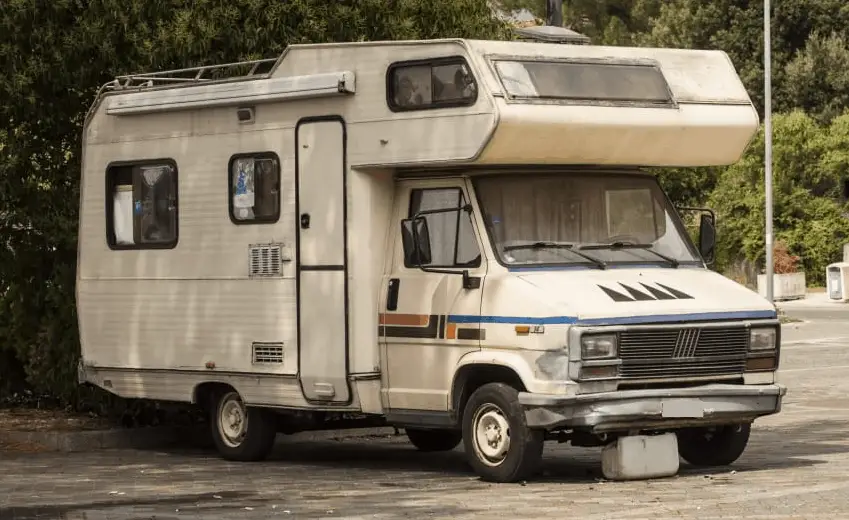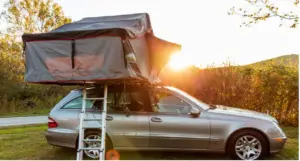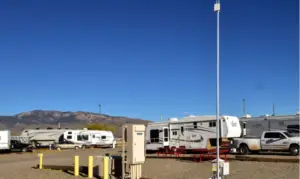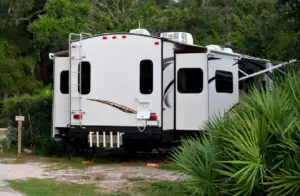The problem with answering whether old RVs are worth buying isn’t as simple as saying yes or no.
I wish it were.
For some people, purchasing a used RV is one of the best decisions they have ever made. They saved a ton of cash. They got a few years out of it.
For others, picking up an old RV is not so great. They suffer regular breakdowns. Require parts that are difficult to source etc.
The purpose of this article is not so much to answer ‘are old RVs worth buying?’, because they are. The aim is to talk about a few of the things you need to be on the hunt for in order to ensure you get your money’s worth.
Pros of Buying Old RVs
RVs are expensive. Really expensive. For many people, being able to buy a brand-new RV is nothing more than a pipe dream. An old RV? Probably, more of a reality.
Buying used means that you have an actual opportunity to get out there and enjoy the open road. The thing is, the vast majority of RVs on the market haven’t really been used all that much. This means that you may be able to find yourself a decent RV with a good mileage on it.
It isn’t just the initial cost of the RV which will be lower either. Most older RVs will also have a cheaper insurance cost. It will also be cheaper to register the RV. Although, this is all dependent on where you live.
A lot of these used RVs will also be packed to the brim with features and upgrades that the previous owner decided was necessary. They may come decorated. It may come with appliances that new RVs don’t come with.
The previous owner may include additional accessories that make owning the RV that much better. This will all be money saved as you won’t need to go out and buy it on your own once you own the RV.
Here is the summary of pros or advantages of owning used RVs
- Used RVs can be bought at less price
- They can be insured at less cost
- Registering used RV is also cheaper
- Used RVs may come with upgrades
Cons of Buying Old RVs
Obviously, the biggest downside is that you may be buying an RV which doesn’t work. Well, not work as best as you would hope.
A lot of the risk here can be prevented by going out and getting an inspection done on a vehicle before you make your final purchase, but even then, not all risks can be spotted.
You need to remember that even if the vehicle works now, because it is older, if something goes wrong you may find it even harder to get your hands on spare parts that you need to keep the vehicle in perfect running condition.
So, you will probably get a lower number of years of use out of the vehicle in comparison to a new one.
If you are planning to take out a loan to purchase the RV, then you also need to be aware that the interest rates on that loan are going to be a lot higher than if you purchased new. This is because there is a lot more that could potentially go wrong with the vehicle, and the lender wants to ensure that they are going to make a little bit of profit.
The vehicle will also likely be tailored to the last owner. So, while in some cases this can make old RVs worth buying. There is also a chance that you will end up with things in your vehicle that you simply won’t need and could be costly to replace.
This is before you even start to think about all the suspicious stains that the previous owner may have ended up leaving behind. Not a good thing at all.
The older vehicles are a lot less fuel efficient too. So, if you are planning to use the RV a lot, the money saved now could be lost later-on when you are forever purchasing fuel.
What to look for when purchasing an old RV
Yes. That does seem like a lot of cons when it comes to buying an old RV, but I promise you that it isn’t as bad as you may think.
As long as you do your own due diligence, you should be able to purchase something that gives you bang for your buck.
In this section, I want to share few tips and tricks that should make purchasing an old RV that much easier for you.
1. Hire an Inspector
At the absolute minimum, you should always try to hire somebody that has experience in inspecting RVs. A used RV may turn out to be a lemon if not inspected well enough.
Yes. This is going to cost you a little bit of money. However, it is going to be nowhere near the amount of cash you would end up spending if you decided to buy an RV without an inspection.
You will be surprised at just what an inspector would be able to pick up that you would miss.
2. Never buy an RV without seeing it first
It is important that you never purchase an RV without seeing it first. If you do, then you are probably going to run into issues.
There are some sellers who will try and suggest that you should do this. If this happens, then you know that you will be running into issues later on down the line.
3. Check for mold
Older RVs are more prone to mold. Obviously, mold is bad enough. However, the presence of mold will indicate other problems with the RV. This means water issues or leakage issues. It can be tough to fix these. You should be able to see mold without too much difficulty, or at least smell it.
4. Check the RV interiors thoroughly
A old used RV will obviously have interiors that will be not as you may like. An old refrigerator may not be cooling faster. Camper air conditioner is taking lot of time to cool down the bedroom.
There could be issues with the floor, leaking roof or stained walls. Window may not be closing easily. Underside of the RV could have rust. Cabinets may not be in good condition. All in all there could be several things that will need thorough checking.
5. Look for problems with the ceiling
It is important that you check the ceiling for water damage. While some water damage can be repaired, you don’t really know the extent of it until you remove the ceiling, and it is unlikely that the seller is going to allow you to do that.
This means that if there is any sign of water damage (i.e. brown spots or a ceiling which is starting to bend), then you will want to steer clear.
6. Buy from somebody reliable
Sometimes, it is best to pick up your motorhome or camper from a decent company. A known seller of used RVs. While you can’t always be 100% sure that what you are getting is of a high-quality, the chances are going to be much, much higher.
You may also want to look into clubs for specific RV manufacturers in your local area. Chances are that there will be somebody at these clubs looking to sell their RV. You can be sure that it is probably kept in good condition if this is the case.
Should you buy very low price RVs?
Honestly I would be extra careful if someone is selling an RV way beyond a price that isn’t matching with its depreciation pattern. One can also check on NadaGuide to verify the value of the RV.
A decent RV will have a price that is inline with its normal depreciation. So, don’t try and get something that very cheap or very old.
How old of an RV should you buy?
There isn’t really a maximum age on an RV. However, if the RV is more than 15 or 20-years old, then it is probably not going to be worth picking up.
The interior of the RV is going to be dated, and the mechanics of the RV are probably going to be coming close to the end.
Since you don’t really have an idea of how well the motorhome or travel trailer has been looked after on the mechanical front, it isn’t really worth going beyond 15 years. This is the maximum lifespan too.
Ideally, if you are picking up a used RV, then it should be somewhere between 5 and 10 years of age. Most RVs have a maximum lifespan of about 200,000 miles.
How long do RVs hold their value?
As with other vehicles, the second the RV is driven, the value will start to fall. In fact, the first year will instantly reduce (on average) about 21% from the value of the vehicle.
The value of the RV will start to fall rather quickly until about the 5 year mark. Then, for a good number of years, the value of the RV will barely fall.
Depreciation among different types of RV varies. Like a class A motorhome depreciation is different as compared to a travel trailer and so it is for class C RV. But overall they do depriciate a lot.
This means that most RVs (if you want to get bang for your buck) should be purchased around the 5-year mark. In the years after that, you won’t really be losing much extra cash if you opt to sell the RV on.
Why not brand new RV?
So, why don’t we just go for a brand new RV? Why even worry about the cons of used RV. Lets check out the cons of brand new RVs.
- They are too costly. A branded travel trailer won’t come cheap. Imagine class A or class C motorhome prices. You have to shell out loads of money.
- Branded RVs may not be a perfect fit for you. You may want customization and changes that can be difficult with branded RVs.
- Insurance cost is high. More luxury means more insurance cost.
- Very high depreciation in branded RVs
- A high risk investment. If it doesn’t fit your requirements you may have to face high loss during selling.
The best RV brands to buy used
Honestly, your best bet is to stick to some of the biggest manufacturers around. Part of the reason for this is that these companies have a reputation to uphold.
When they make a product, it is going to be built to last. They don’t want to get a bad reputation for putting out poor quality RVs that only last a few years.
The second is that it is likely that it is going to be easier to source spare parts from a larger company than a smaller RV company. Their resale value will be better so you may not get them cheap even though used.
If you stick to one of these brands when buying ‘used’ then you should be in a good position. Here are some brands to look for.
There are other potential ‘used’ brands outside of this, but any of those should always be the first place you look. It probably helps that these are ‘proven’ brands too. Ones that have demonstrated repeatedly that they just work.
Quick tips to buy an old or used rv
- Do not buy on the first visit. Check at multiple dealers. Check online for options. There are many sites from where you can buy used motorhome or travel trailer.
- Determine the value of the RV. Make sue of NadaGudies
- Negotiate with the dealer or owner. Ask for discounts, or any other offers.
- Make sure RV is in good condition. Check its maintainence history.
- Do not buy RV with water damage.
- Check roof, tires for any issues.
- Purchase the RV only if its your requirements. Do not just buy because it is coming at a low cost.
Conclusion
So, in summary; used RVs are worth buying. You just need to do your due diligence. Don’t just jump in and buy the first RV that you find, because you are far more likely to run into issues like that.





